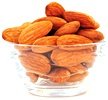 THE FOOD FACTOR: SATURATED VS. UNSATURATED Way back in 1984, the Coronary Primary Prevention Trial provided some of the first evidence that reducing total and LDL cholesterol levels significantly reduces the incidence of CHD; more recent investigations have affirmed this association.
THE FOOD FACTOR: SATURATED VS. UNSATURATED Way back in 1984, the Coronary Primary Prevention Trial provided some of the first evidence that reducing total and LDL cholesterol levels significantly reduces the incidence of CHD; more recent investigations have affirmed this association.
Dietary habits play a major role in determining your total blood cholesterol level, as well as the relative distribution of HDL and LDL cholesterol. Consumption of foods high in saturated fat and LDL cholesterol are a major reason for out-of-control cholesterol levels and rising heart attack rates in the United States.
 All foods that contain fat have different distributions of saturated and unsaturated fats. Saturated fat is found primarily in foods that come from animals - red meat (particularly fatty cuts), poultry with the skin on, whole-milk dairy products (whole milk, butter, cheese, ice cream), and tropical oils (coconut, palm kernel, etc.). Consumption of saturated fat increases LDL and total cholesterol in the bloodstream.
All foods that contain fat have different distributions of saturated and unsaturated fats. Saturated fat is found primarily in foods that come from animals - red meat (particularly fatty cuts), poultry with the skin on, whole-milk dairy products (whole milk, butter, cheese, ice cream), and tropical oils (coconut, palm kernel, etc.). Consumption of saturated fat increases LDL and total cholesterol in the bloodstream.
On the other hand, unsaturated fats do just the opposite: They increase HDL cholesterol and reduce LDL cholesterol and triglycerides. Good sources of monounsaturated fat are canola, peanut and olive oil; olives; avocados; and most nuts. Polyunsaturated fat can be found in corn, soybean, safflower, and cottonseed oils, as well as in fish. And let's not forget omega-3 fatty acids, a type of polyunsaturated fat. Evidence suggests omega-3s, good sources of which are fatty fish, such as mackerel, salmon, sardines or swordfish, may help prevent heart disease. That's one reason why the American Heart Association currently recommends that everyone eat at least two servings of fish on a weekly basis.
THE HOT TOPIC: TRANS FATS Trans fats are liquid vegetable oils that are transformed via a process called "hydrogenation" into solids at room temperature. This chemical process transforms healthy vegetable oils into unhealthy fats that have been shown to raise LDL cholesterol.
 In today's world of processed foods, more and more non-animal products contain hydrogenated fats/oils, a source of trans fats - which actually cause your body to make more cholesterol. Foods that contain trans fats include margarines, vegetable shortening, partially hydrogenated vegetable oil, countless fast foods (especially French fries), and most commercial baked goods (crackers, donuts, potato chips, etc.).
In today's world of processed foods, more and more non-animal products contain hydrogenated fats/oils, a source of trans fats - which actually cause your body to make more cholesterol. Foods that contain trans fats include margarines, vegetable shortening, partially hydrogenated vegetable oil, countless fast foods (especially French fries), and most commercial baked goods (crackers, donuts, potato chips, etc.).
The good news, if there is any, regarding trans fats is that as of 2006, the Food and Drug Administration requires that food manufacturers list amounts of trans fats on the nutrition information labels of products. You've probably also noticed that increasing numbers of manufacturers now make it clear that their products contain no trans fats.

